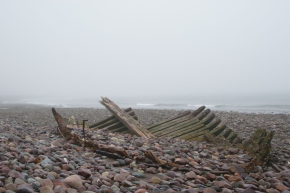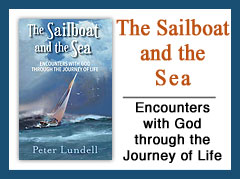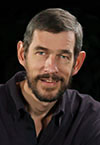The Woman by the Boat-2
 This is the photo from Google Earth that first inspired me to write the story. The boat I depict is a bit different, but the basic image is the same–along with the rocky beach and the mist.
This is the photo from Google Earth that first inspired me to write the story. The boat I depict is a bit different, but the basic image is the same–along with the rocky beach and the mist.
Photo credit: frparm on Google Earth:
http://www.panoramio.com/map/#lt=46.991516&ln=-56.278142&z=4&k=2_____
“The Woman by the Boat”
–Second of three parts–
One old man didn’t need to see her at the market. Charles lived in a cottage at the north end of the rocky beach. Boat parts, nets, harpoons, and tackle decorated his home inside and out. He had survived a lifetime on the sea. And he had survived after returning one day to find his own wife lifeless on the floor.
The villagers had long ago stopped asking him about the woman because he always told them, “Ask her yourself.”
His son had gone to find a salaried job in St. John’s a hundred miles away. Life in a Newfoundland fishing village did not appeal. Except for his holiday visits, the woman was the only family Charles had. Through the window above his kitchen basin he watched her, day after day. If she didn’t appear, he made his way to her shack to check on her. When others appeared nearby, whether fishermen or boys throwing rocks into the water, he watched to make sure they didn’t mistreat her.
Yet a year and a half was too long.
Through the previous summer he’d gone out to talk to her many times. She listened, but she didn’t respond.
Another gray morning Charles peered out his window until she approached the boat wreck and sat by it, like part of the wreckage itself. He put on his shoes and jacket.
He used a walking stick to keep his balance on the rocks until he could lean against the beam that had once been the boat’s prow.
“Jane.” He waited for her to make eye contact.
She looked up with reluctance in her eyes.
“How long will you keep doing this?”
She adjusted herself on the rocks and leaned against a rib. Then looked out at the sea.
“Jane! No more silence. You have to move past this.”
“Do I?”
“Yes. You do.”
Her gaze turned back to him. “Why?”
“Why?” he muttered to himself. “Because . . .” He shook his head, then stammered as one does when words elude the tongue. “Because you need to start over again. A new husband, a new family. There are men up there who could use a wife. Who need a good woman like you.” He paused and she remained still. “You need a good husband too.”
“I’m no good for that any more. You of all people should know.”
“No. You can start over again.” He knelt with one knee to the rocks and leaned forward. “You could be happy again—if you allow yourself.”
“I don’t want to be happy.”
“You’re deceiving yourself. I remember how happy you were as a child and how happy you were with Bobby. I have no doubt you could be happy again.”
“It would be wrong.” She shook her head. “Immoral.”
He looked down with a heavy breath. “Immoral to be happy.”
“You know I told him to go out that day. That we needed a good catch to pay our bills.” She dug her nails into a boat rib. “You’d gone out in weather like that. That’s what men do. I even said a prayer and told him he’d be okay.”
Charles clenched his teeth and looked away from her. “I know,” he whispered.
A gull cawed as it swooped by and landed near the water. It stepped from stone to stone, scanning and pecking. An ordinary day of its ordinary life. It glanced at them, whether hoping for food or wary of a sudden move. Then it strutted away to leave them in their disconnected world.
Her nails still in the wood, her eyes were as vacant as her voice, “You don’t need to keep coming out here.”
“I care about you. You’ve grieved long enough.”
She looked down and folded her hands in her lap.
“Look at you. Since Bobby’s been gone, you haven’t had the money to buy clothes or to keep up your home. It’s run down.”
“The roof’s still standing.”
“It leaks.”
“I have buckets.”
“And you don’t have enough to eat. You’ve lost weight.”
“Women are always trying to lose weight.”
Charles stood and growled in disapproval. “I will not let you continue doing this.”
“You can’t stop me.”
The two allowed a brief stillness to settle. He leaned against the prow and she against a rib—like two opposing remnants of the accident that refused to concede. The shroud of gray slowly lifted above the hill that abutted the beach. Foot-high waves washed the shoreline. Their slow, rhythmic gush rinsed so much away, yet nothing seemed able to wash away the death shroud in which she wrapped herself.
“Life goes on, Jane, whether you like it or not.” He sighed. “And you might as well get on with it. Life is slow in this village, but it doesn’t stop. You’re pretending it stopped.”
“Leave me alone.”
“Accidents happen. Boats sink in storms. Fishermen drown. That’s part of the deal, always has been. You knew that when you married Bobby.”
Jane remained quiet.
Charles lifted his hands with exasperation. “He would have gone out whether you told him to or not.”
“No, he wouldn’t have.”
“It was his nature to hesitate while he sized up a difficulty. Then he would pursue it with everything he had.”
“You’re just trying to make me feel better. I encouraged him.”
“None of us knew the waves would pound him into the shoals.”
“I should have known.”
“How could you? Winds and currents shift. I survived storms and so did he. But that one he didn’t.” Charles breathed deeply and stared at the gray water. “A person doesn’t even need storms to die. A wife could be lying on the kitchen floor when her husband comes home.”
Jane let out a high-pitched cry like a whining teapot, its pressure whistling out.
Charles pursed his lips and let her go on. As she quieted, he said, “Life continues whether you like it or not.”
She shook her head.
“Your endless grief is your own choice, Jane. I will not feel sorry for you.”
She gathered herself enough to speak. “I’m not asking you to.”
“But I can’t bear seeing you do this to yourself.”
“Then look at something else.”
“No. I care about you, and I won’t just let you drown yourself in self-condemnation. Or self-pity.”
“Neither of the above.”
“Oh? Everyone—even God—has forgiven you. Except for Jane. Is your crime too grievous to be forgiven? Are you too special?”
She narrowed her eyes and seethed.
“Let it go.”
She only stared at him.
As if to avoid her glare, he turned away and held the boat’s prow.
The ordinary world around them continued to wash waves onto the shore and send gulls circling and cawing as they always did, regardless of storms at sea or storms in people’s hearts.
Charles started to speak but seemed to pull his words back. He hesitated then turned to her. “And you can’t be feeling sorry for Bobby. From his childhood he always had a big heart. He cared about other people, no matter who they were. You weren’t the only lassie who loved him when he was young. He grew to be such a fine man largely because he had the Spirit of God in him. Not just religion. Spirit. You remember.”
She nodded.
“He’s with God now. And he’s happy. He’d want you to be happy too—not doing this.”
She stopped nodding.
“You also know that I . . . was the one who taught him, who led him to that. That’s what gives us hope and a reason to get past our grief and live again. I tried to teach you too.”
Her eyes seemed to cloud over as she stared at the sea.
“Bobby drowned once, but you drown every day. And whether or not you feel guilty, you feel sorry for yourself at having lost him.”
Her lower lip trembled. Her eyes welled with tears.
“This boat wreck is like a tomb, and as often as you re-drown yourself, you re-bury yourself here.”
She breathed heavily and wiped her tears. Then spoke through clenched teeth, “It’s my choice.”
“Stop it, Jane. It’s a foolish choice.”
She glared at him, wide eyed.
“We can’t bring him back. But we can bring you back. Come back to us, Jane.”
She rose to her feet and stumbled toward to her shack.
“We have to get rid of this tomb!” He waited. “Do you hear me?”
She didn’t look back.
_____
Continued…
I invite your feedback.







